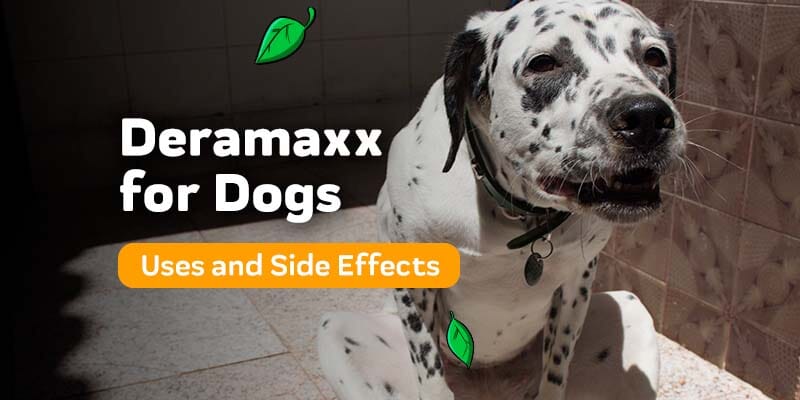Like humans, dogs can develop several health problems as they age. Arthritis is one of the most prevalent conditions in elderly canines. Sadly, there isn't a cure for arthritis. It's a condition your dog will need help with for the rest of their life. However, there is a silver lining. With modern veterinary medicine, there are numerous medications and treatment options to make your pooch's symptoms more bearable.
While some medications may come with adverse side effects, they are far better than living with joint pain. Novox is an anti-inflammatory medication used to reduce arthritis pain and inflammation in dogs. In this post, we'll cover everything you need to know about Novox, and whether it's the right medication for your pooch.
What Is Novox?
Novox (also known as Rimadyl and carprofen) is a prescription medication given to dogs struggling with arthritis or pain after surgery. It's a non-steroidal anti-inflammatory drug (NSAID). Some non-steroidal anti-inflammatory drugs that you may be familiar with are aspirin, ibuprofen, and naproxen.
The caplets are given orally, and they can help deal with several symptoms of arthritis. Carprofen and other NSAIDs can produce positive results for your dog in a matter of just a few days. As a result, it's one of the most common medications veterinarians in the United States prescribe canines.
Novox, FDA Approved to Treat Pain and Inflammation in Dogs
Novox is a non-steroidal anti-inflammatory drug (NSAID) that is used to treat pain and inflammation in a variety of animals. In the United States, it is only FDA approved to treat dogs. The recommended Novox dosage for dogs is 2.27 mg/lb given every 12-24 hours.
The most common side effects of Novox include vomiting, diarrhea, and decreased appetite. ulcers or gastrointestinal bleeding. If you notice any of these clinical signs, contact your veterinarian immediately.
The active ingredient in Novox is carprofen, which is a synthetic analogue of phenylacetic acid. Carprofen works by inhibiting the production of prostaglandins, which are substances that are involved in pain and inflammation.
Allergic reactions to Novox are rare but can occur in some animals. If you notice your dog displaying any signs of an allergic reaction (e.g., hives, facial swelling, difficulty breathing), contact your veterinarian immediately.
Is Novox Safe for Dogs?
While Rimadyl and NSAIDs affect dogs differently, it's claimed to be a relatively safe medication for treating joint pain. However, there are a few precautionsdog owners should consider before putting their pup on Novox or any other non-steroidal anti-inflammatory drug.
Pups that have bleeding issues, stomach ulcers and pain, or Von Willebrand's disease shouldn't take carprofen caplets or other NSAIDs. Dogs with hypersensitivity, irritable bowel syndrome (IBS), and liver disease can also experience adverse side effects.
Novox can also interact poorly with other prescribed medications, so always inform your veterinarian of your dog's current medications beforehand. With that in mind, your veterinarian should thoroughly examine your pet's liver and kidney health before prescribing them Novox caplets.
When Is Novox Prescribed for Dogs?
Veterinarians use carprofen to treat a wide range of conditions and diseases. The primary condition is osteoarthritis since Novox is an anti-inflammatory medication. Osteoarthritis is a painful condition with a vast array of uncomfortable symptoms, such as:
- Pain and inflammation around the joints
- Reduced mobility
- Stiffness
- Muscle weakness
- Fatigue
Other than joint pain, Novox is a common medication for dogs that have just had surgery. Novox can be used for dogs who have undergone any type of soft tissue surgery, such as spaying or neutering. In addition, to surgical pain, Novox can also be used to relieve joint pain and other forms of inflammation. Novox can also help reduce fevers and any other issues related to joint pain and inflammation.
Novox Dosage for Dogs
The proper dosage can vary between sizes, ages, and breeds. Most Novox prescriptions come with 25mg, 75mg, or 100mg caplets. The easiest way to determine the proper dosage for your dog is to give them 1mg of Novox for each pound of bodyweight. However, your veterinarian should advise you on the proper dosage, so it's best to listen to what they have to say.
When Rimadyl tablets are prescribed, it's important to follow the recommended dosage and administration instructions to avoid any stomach upset or discomfort. To administer Rimadyl tablets, it's best to include it with a meal. Make sure your dog drinks plenty of water after taking the medications to avoid any pain or discomfort.
Sometimes life happens, and you may forget to give your pup their Novox. In that case, skip that dosage instead of doubling the next one.
Possible Novox Side Effects in Dogs
Although Rimadyl and other NSAIDs are usually safe for most dogs, that's not to say that some may experience adverse reactions. Most side effects from a non-steroidal anti-inflammatory drug occur after long-term use, and the severity can range based on several factors. In extremely rare cases, canines can experience liver failure or even death. However, it's incredibly uncommon for pets to die directly from taking carprofen.
Some less severe side effects include:
- Vomiting or upset stomach
- Changes in appetite
- Yellowish skin around gums and eyes
- Itchiness
- Reduced levels of physical activity
If you notice one or more of the above side effects, stop giving your dog Novox and take them to the veterinarian right away. Your veterinarian can offer a possible alternative (see below).
When Should Novox Not Be Prescribed for Dogs?
Carprofen is a pain reliever that is commonly prescribed for dogs. It is part of a class of drugs known as non-steroidal anti-inflammatory drugs, or NSAIDs. Carprofen can be effective at relieving pain and inflammation associated with arthritis, surgery, and other conditions. However, there are some instances when carprofen should not be prescribed for dogs.
One such situation is when a dog has a bleeding disorder, such as Von Willebrand's disease. Von Willebrand's disease is one of the most common bleeding disorders in dogs, and it can cause serious and potentially life-threatening bleeds.
Dogs with this condition are at risk of serious internal bleeding if they take carprofen. In addition, dogs with kidney disease may be unable to clear carprofen from their system, putting them at risk for toxicity.
One of the most serious potential side effects of carprofen is gastrointestinal damage, which can lead to severe vomiting, diarrhea, and black or bloody stools. Other serious side effects include liver and kidney damage. Because of these potential risks, carprofen should only be used when other pain relief options have failed or are not possible.
Finally, pet owners should be aware that carprofen can cause pale gums in some dogs. If you notice any of these side effects in your dog, contact your veterinarian immediately.
Alternatives to Novox in Dogs
When your dog has arthritis, the primary mission is to reduce pain and inflammation. Doing so will ensure they live a more comfortable life, and you don't have to watch them slowly become less active.
While veterinarians are quick to give a prescription drug such as Novox since it's a highly effective non-steroidal anti-inflammatory drug, that doesn't mean some canines won't experience any negative side effects from the medication. So, what are the options for pets who can't take Rimadyl caplets?
Here are some effective natural alternatives that can keep your pup nice and healthy, even with osteoarthritis:
CBD Oil
CBD oil is quickly taking the world by storm as a natural alternative to numerous pain medications for humans. However, people aren't the only ones who can reap the benefits. CBD oil can potentially help dogs with a wide range of diseases and disorders. We developed our Innovet PurCBD range purely to help relieve pain and improve wellbeing in dogs with a variety of health issues.
Cannabidiol (CBD) is a compound found in cannabis. Don't worry, CBD oil won't get your dog high since it doesn't contain enough THC, the psychoactive compound in marijuana.
CBD is typically used for treating pain and inflammation. The cannabinoids interact with the body's endocannabinoid system, which is responsible for regulating a wide range of bodily functions.
Like humans, canines also have an endocannabinoid system. As a result, they can receive similar benefits from CBD and other cannabis compounds. CBD oil can help your dog:
- Reduce pain and inflammation
- Regulate their appetite
- Improve sleep
- Reduce stress and anxiety
- And more
However, always consult your veterinarian before giving your pet CBD oil.
Omega-3 Fatty Acids
Omega-3s are an essential part of our diet that helps combat a wide range of diseases. While Omega-3s typically get a lot of credit for reducing the risk of heart disease and cardiovascular illnesses, they can also help reduce the symptoms of arthritis. A diet rich in Omega-3 fatty acids can improve joint health, which will ultimately reduce arthritis pain and inflammation.
You can find numerous chews and tablets that are rich in Omega-3s. Our Advanced Mobility Support Chews contain wild Alaskan salmon oil which delivers essential fatty acids to your dog, helping to ease swelling and inflammation.
Turmeric
Turmeric is widely known throughout the world as a superfood for its extensive list of health benefits. For starters, turmeric has anti-inflammatory properties which are key for fighting arthritis. What's more, turmeric can also treat bacterial infections, viruses, and even some cancers. Since turmeric is already used in food, adding it to your pup's diet shouldn't be too tricky. Find a dish they love and add it using a paste. You can also find turmeric tablets in some pet stores.
Bear in mind that these natural alternatives won't produce results overnight. Instead, you need to make them an integral part of your dog's diet before you'll start to notice symptoms wearing down. As long as you're consistent, your dog should start to feel stronger and healthy, even with arthritis.
Conclusion
While arthritis is a frustrating and uncomfortable condition for you and your dog, you must never stop fighting. Sure, there's no direct cure, but there are things you can do to make your pup's life more comfortable. Novox and other NSAIDs are viable medications, but may not be the best choice for your pooch. Consult with your veterinarian about Novox and try some alternatives above.
We hope this article helps you better understand the non-steroidal anti-inflammatory drug Novox — feel free to share it with any of your fellow dog parents you think might benefit.

















